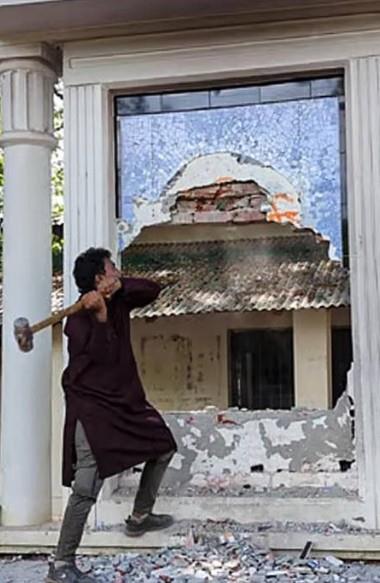Terror Boost In Dhaka: HUJI Revival, ISI Meetings And Jamaat's Support Worry India
- Jihadi-Islami (HUJI), which has its operational base in Bangladesh, is reviving its activities at a very fast pace, thanks to a friendly regime in the country, Indian security officials have learnt.
The outfit was largely kept under check during the Sheikh Hasina rule. However, following her ouster, the HUJI has revived its activities and has been attempting to set up modules along the border with India.
The HUJI was originally born in Pakistan and was meant to focus on Jammu and Kashmir. It was meant to work alongside the Lashkar-e-Taiba and carry out strikes in the union territory. However, with the Jaish-e-Mohammad also seeking to be a major player in Kashmir, the ISI gradually shifted the activities of the outfit to Bangladesh, with an intention of targeting West Bengal and India's northeastern states.
The HUJI had managed to set up several modules in northeast India and West Bengal, but in the last couple of years, it had fallen silent due to enhanced security and close monitoring by the Indian agencies.
The fact that the Hasina regime had kept the outfit under check was also a reason for the lack of action. After the Jamaat-e-Islami-backed Muhammad Yunus was made the caretaker of the interim government, several radical outfits, including the HUJI, have become extremely active.
With Yunus signing deals with Pakistan, it became extremely easy for the ISI to access Bangladesh. Intelligence Bureau officials say that there have been at least six meetings between the ISI and HUJI leaders in the last three months. All these meetings were aimed at reviving activity and also setting up more modules close to the Indian border.
The HUJI was also given security guarantees by the Jamaat to set up its modules. In this process there has been a free flow of arms and ammunition and funds for the HUJI.
What also gave a massive boost to the HUJI was the release of Abdus Salam Pintu. He is a former junior minister and member of the Bangladesh Nationalist Party (BNP). He was accused of funding terrorists while operating from Pakistan occupied Kashmir (PoK). He was instrumental in helping the HUJI carry out attacks against India. He was sentenced to death in 2008 for attempting a grenade attack on Sheikh Hasina in 2004. However, in December 2024, he was released after being in jail for 17 years.
Pintu was also instrumental in aiding HUJI's weapons procurement, recruitment and training programmes at camps in PoK. He was also accused of helping train HUJI madrasa students in firearms and explosives.
Now, with a friendly regime and Abdus walking out freely, the Indian security officials say that he is likely to get fully involved with the HUJI once again. He knows the terror group well, and the ISI is likely to use him to carry out the same activities he did before his arrest.
However, Pintu is not just one person with such a record that the Yunus government released following the ouster of Sheikh Hasina. It also freed terrorist Sheikh Aslam, a member of the banned terror group Ansarullah Bangla Team (ABT) in September 2024.
The most crucial decision that the Yunus government took was to lift the ban on the Jamaat. This group considered highly radical and dangerous is what is helping the rise of terror groups such as the HUJI in Bangladesh. The fact that it is doing so with the direct help of the ISI is what is causing the security headache for the Indian security agencies.

Legal Disclaimer:
MENAFN provides the
information “as is” without warranty of any kind. We do not accept
any responsibility or liability for the accuracy, content, images,
videos, licenses, completeness, legality, or reliability of the information
contained in this article. If you have any complaints or copyright
issues related to this article, kindly contact the provider above.
Most popular stories
Market Research

- Cartesian Launches First Outsourced Middle-Back-Office Offering For Digital Asset Funds
- R0AR Launches Buyback Vault: Bringing 1R0R To R0AR Chain Unlocks New Incentives
- FBS Analysis Shows Ethereum Positioning As Wall Street's Base Layer
- Bydfi Joins Korea Blockchain Week 2025 (KBW2025): Deepening Web3 Engagement
- Ethereum Based Meme Coin Pepeto Presale Past $6.6 Million As Exchange Demo Launches
- Moonbirds And Azuki IP Coming To Verse8 As AI-Native Game Platform Integrates With Story






















Comments
No comment